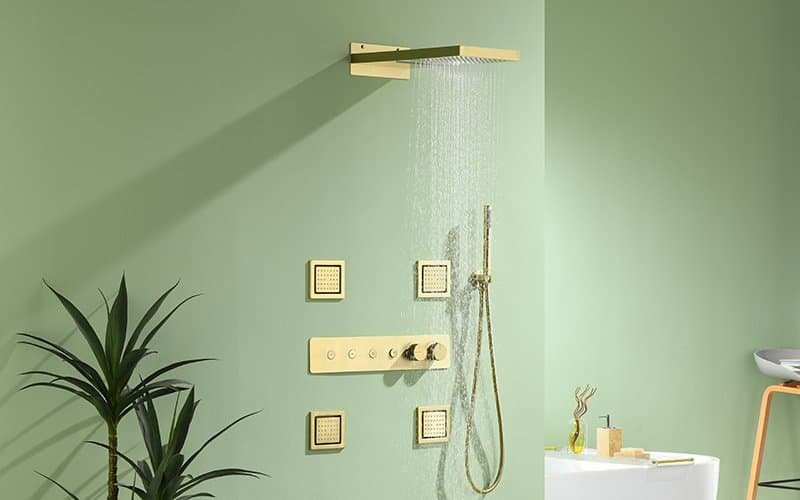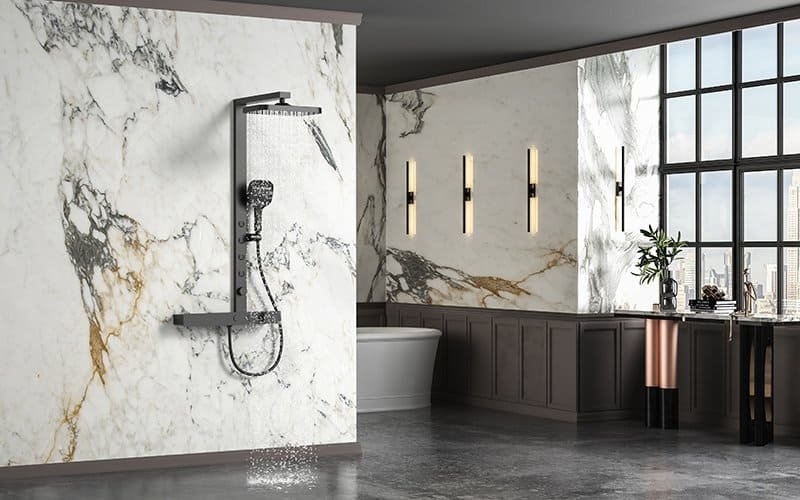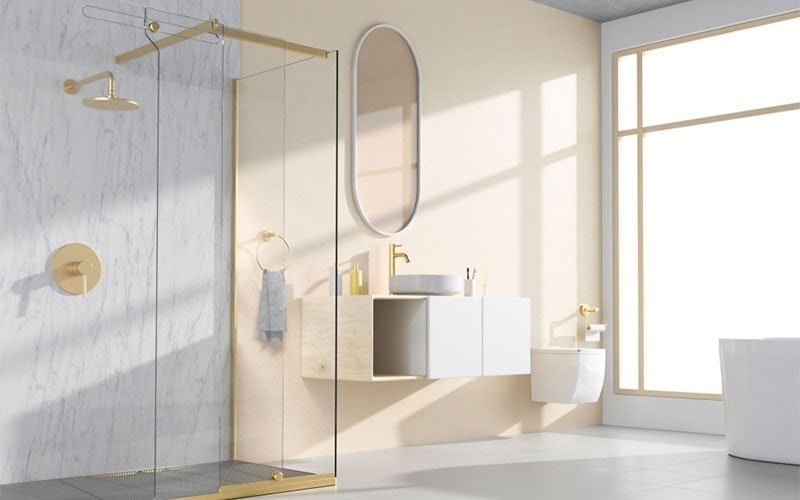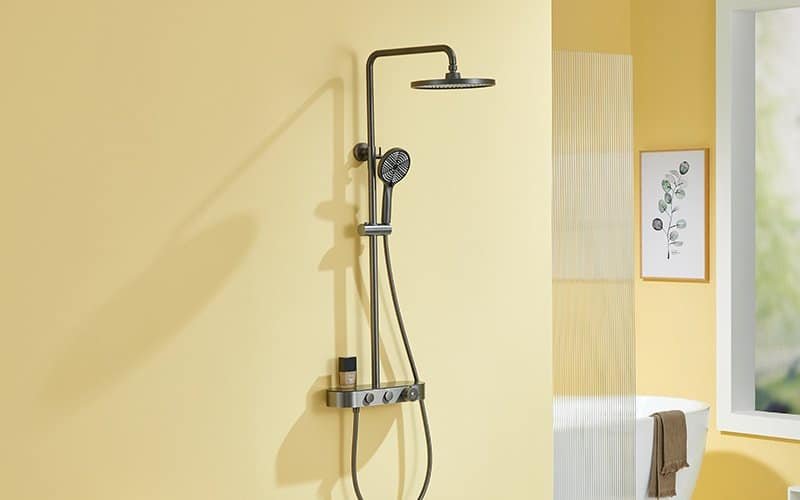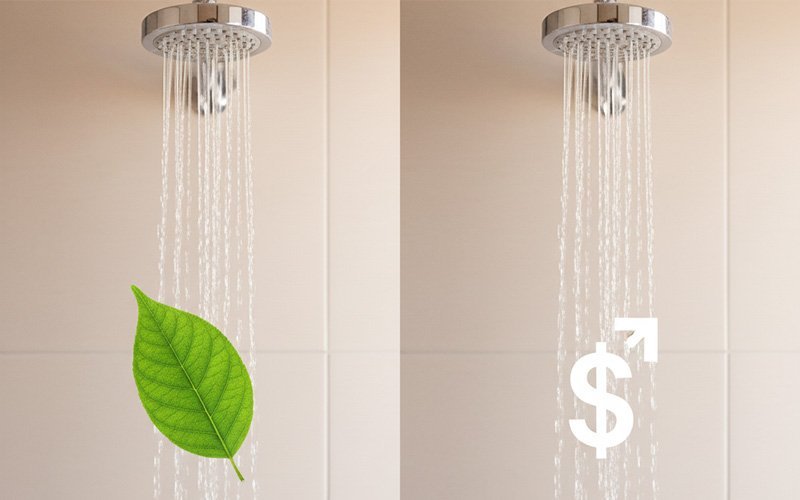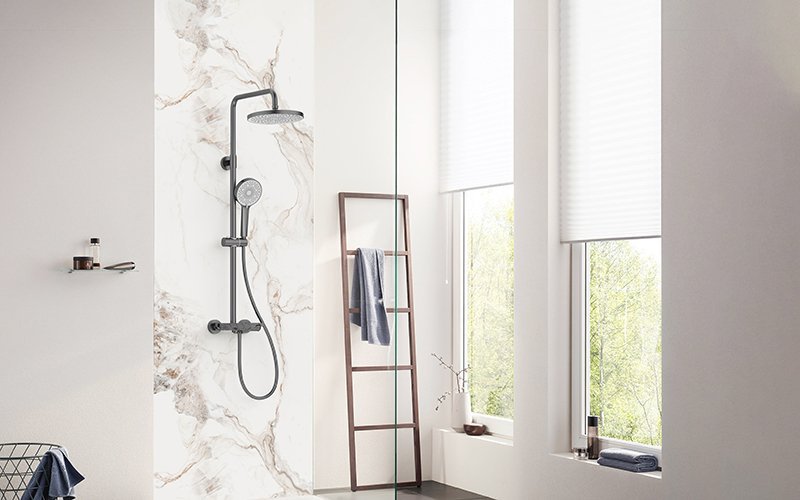
Choosing the right shower system can significantly enhance your bathroom experience. Various types of shower systems cater to different needs, preferences, and home plumbing setups.
When designing or renovating a bathroom, one of the most critical decisions is selecting the right shower system. Shower systems today go beyond mere functionality. They impact the bathroom’s look, water usage, and your shower experience.
Types of Shower Systems by Control and Function
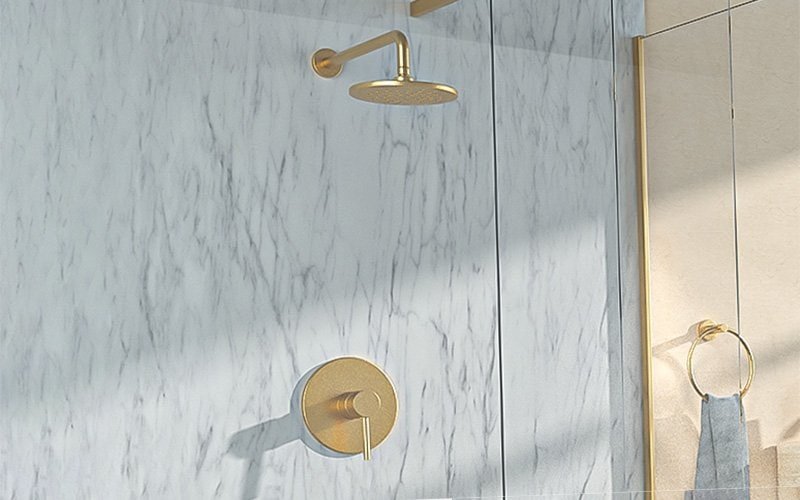
Single-Handle Shower System
A single-handle shower system features a single lever or knob to control both water temperature and flow, often paired with a mixing valve for precise adjustments
Commonly Used For: Small or modern bathrooms, families, or those needing accessible features. Not ideal if you want ultra-precise temperature control or a classic aesthetic.
Key Features of single-handle shower systems:
- Single lever for easy temp/flow adjustment.
- Often includes pressure-balancing features.
- Compact, modern design with various finishes (chrome, nickel, etc.).
- Supports multiple showerheads (rain, handheld, etc.).
- ADA-compliant options for accessibility.
Pros of single-handle shower systems:
- Simple, one-handed operation—great for kids, the elderly, or multitasking.
- Can offer stable temperature control.
- Sleek, space-saving design fits most bathrooms.
Cons: of single-handle shower systems:
- Tricky to get exact temperature compared to double-handle systems.
- Cartridge can leak or wear out, needing replacement (brand-specific, costly).
- Prone to clogging in areas with hard water or debris.
- Less flexible for precise hot/cold tweaks.
- Modern look may not suit traditional bathrooms.
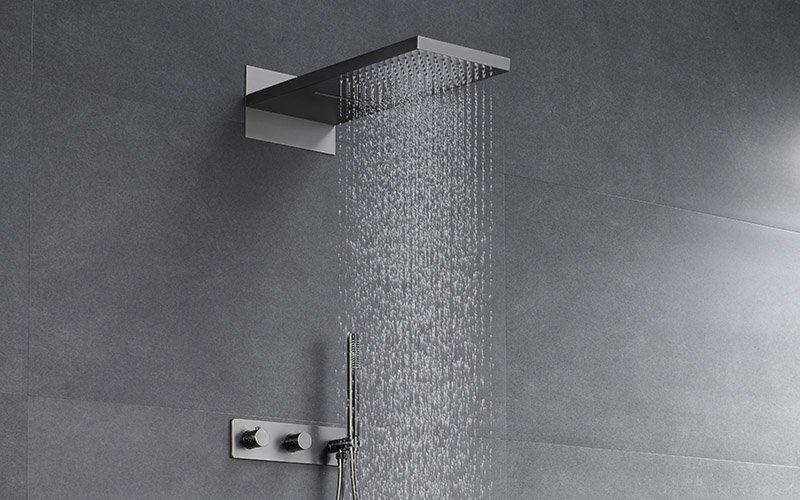
Dual-Handle Shower System
Features separate controls for water temperature and flow rate, allowing more precise adjustments
Best For: Users wanting a multi-function shower (e.g., switching between showerhead and handheld) with clear control over flow and function, and those with complex shower setups. Less suitable for small bathrooms, accessibility needs, or those prioritizing easy temperature tweaks.
Key Features of dual-handle shower systems:
- One handle adjusts water flow (on/off and volume); the other diverts water to different outlets (showerhead, handheld, etc.).
- Often includes pressure-balancing or thermostatic valves for stable temperature.
- Available in finishes like chrome, brushed nickel, or bronze to suit various aesthetics.
- Supports multiple shower outputs, ideal for multi-function setups.
- Some models may include features for temperature fluctuation management.
Pros of dual-handle shower systems:
- Intuitive function switching (e.g., easy toggle between showerhead and handheld).
- Precise flow control with dedicated on/off handle, good for water conservation.
- Versatile for multi-feature showers (rain head, handheld, body jets).
- Durable design with simpler diverter mechanics, reducing leak risks.
- Fits both modern and traditional bathrooms, depending on style.
Cons of dual-handle shower systems:
- Temperature adjustment may require pre-setting or a separate valve, which can be less convenient.
- Two-handed operation isn’t ideal for accessibility or quick adjustments.
- Larger footprint needs more wall space and multiple installation points.
- Some models may not have features to manage sudden temperature changes.
- Diverter maintenance can be tricky if sediment builds up in hard water areas.
Thermostatic Shower Systems
Thermostatic showers automatically adjust temperature to prevent sudden changes, which can be a popular choice for homes with children or the elderly. These showers mix hot and cold water while maintaining the temperature you select, helping to reduce the risk of sudden temperature changes.
Key Features of thermostatic shower systems:
- Thermostatic valve maintains a set temperature, which helps reduce the chance of cold shocks.
- There are separate controls for temperature (dial or handle) and flow/diverter (on/off or function switching, e.g., showerhead to handheld).
- Available in finishes like chrome, matte black, or brass for aesthetic versatility.
Compatible with multiple outlets (rain shower, handheld, body jets) via a diverter. - Often includes safety stops (e.g., 100°F/38°C limit) may include temperature limit stops.
Best For: Budget-conscious users, families needing safety features, or those with simple to moderately complex shower setups. Less ideal for those requiring ultra-precise temperature control or living in areas with frequent hard water buildup.
Pros of thermostatic shower systems:
- Offers consistent temperature, which is a popular feature in homes with kids or the elderly.
- Helps to minimize sudden temperature swings (e.g., when a toilet flushes).
- Flexible configurations support multi-function showers (showerhead, handheld, etc.).
- Precise temperature control allows exact settings (e.g., 100°F/38°C).
- Modern or traditional designs suit various bathroom styles.
Cons of thermostatic shower systems:
- Higher cost due to advanced thermostatic valve technology.
- Complex installation requires professional expertise and more wall space.
- Maintenance can be costly; thermostatic cartridges are brand-specific and pricey.
- May require regular cleaning to prevent mineral buildup in hard water areas.
- Two-handed operation (in dual-handle models) may be less convenient for accessibility.
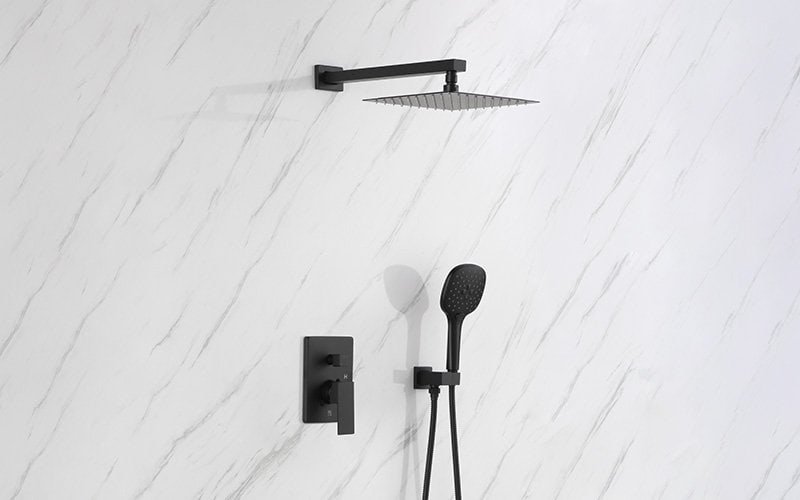
Pressure-Balancing Shower System
A shower system with a pressure-balancing valve that adjusts water flow to maintain consistent temperature when water pressure changes, typically using a single handle for temperature and flow or a dual-handle setup with a diverter for multiple functions.
Key Features of Pressure-Balancing Shower Systems:
- Pressure-balancing valve stabilizes temperature by adjusting hot/cold water flow.
- Single or dual handles: one for temp/flow, another (if present) for diverting to showerhead, handheld, or body sprays.
- Available in finishes like chrome, brushed nickel, or matte black to match decor.
Supports multiple outlets (rain shower, handheld, etc.) with diverter options. - Often includes temperature limit stops.
Best For: Budget-conscious families, those wanting functional and simple showers, or homes with moderate plumbing needs. Not ideal for those needing super-precise temperature control or living in hard water areas.
Pros of Pressure-Balancing Shower Systems:
- Maintains stable temperature during pressure changes (e.g., toilet flush), contributing to a more predictable experience.
- Affordable compared to thermostatic systems, offering good value for its features.
- Simple operation with single-handle models, ideal for ease of use.
- Versatile for various shower setups (single showerhead or multi-function).
- Compact design fits smaller bathrooms and is easier to install than thermostatic systems.
Cons of Pressure-Balancing Shower Systems:
- Less precise temperature control than thermostatic systems; may still fluctuate slightly.
- Single-handle models can be tricky to dial in the exact temperature.
- Reduced flow during pressure drops (e.g., multiple appliances running), which may weaken spray.
- Cartridge maintenance needed; replacements can be brand-specific and costly.
- Dual-handle models require two-handed operation, less convenient for accessibility.
Digital Shower Systems
A high-tech shower system controlled by a digital panel, remote, or smartphone app, allowing precise adjustments to water temperature, flow, and sometimes extra features like timers or music.
Best For: Tech lovers, families wanting safety and customization, or those seeking a luxury bathroom upgrade. Not great for tight budgets, simple setups, or homes with unreliable power.
Key Features of Digital Shower Systems:
- Digital controls for exact temperature and flow settings.
- Remote or app control to start/stop or adjust settings from anywhere.
- Memory presets to save your favorite shower settings.
- Smart features like voice control (Alexa/Siri), LED displays, or timers.
- Works with multiple showerheads (rain, handheld, body sprays) and various water systems (combi boilers, gravity-fed).
Pros of Digital Shower Systems:
- Offers precise temperature control.
- Has available temperature limit settings.
- Customizable with presets for each user, customizable with presets.
- Can help manage water and energy usage.
- Sleek, modern look adds luxury and can enhance a modern bathroom’s aesthetic.
Cons of Digital Shower Systems:
- Expensive to buy and install (can cost $250-$5,000+ with pro help).
- Needs electricity, so power outages or tech glitches can stop it.
- A complex setup may require a plumber or an electrician.
- Tech-heavy interface might confuse non-tech-savvy users.
- Maintenance (like fixing digital valves) can be costly and tricky.
Electric Shower Systems
Electric showers are a popular option in households where energy efficiency and water conservation are priorities. These systems heat water on demand using electricity, instead of relying on a hot water tank or boiler.
This makes electric showers an ideal solution for homes with limited hot water availability.
Best For: Small homes, apartments, or cabins without central hot water, budget-conscious users, or areas with low water pressure. Not ideal for large families, high-flow shower needs, or homes with existing hot water systems.
Key Features of Electric Shower Systems:
- How it Works:
Cold water is drawn in from the main supply and passed over a heating element within the shower unit. The water heats immediately as it flows through. - Energy Efficiency:
Only heats the water you use, making it highly energy-efficient and cost-effective.
Pros of Electric Shower Systems:
- Hot water on demand.
- Ideal for households with an inconsistent hot water supply.
- Heating water on demand makes the system energy-efficient since it doesn’t preheat the water.
Cons of Electric Shower Systems:
- Water pressure may be lower than mixer or power showers.
- Requires proper electrical installation.
Steam Shower Systems
A shower system with a built-in steam generator that creates a spa-like steam room experience, often combined with standard shower features and controlled via a digital or manual panel.
Steam showers are an option for those who prioritize creating a specific ambiance during their shower.
Best For: Homeowners seeking a luxury spa experience, those with health conditions benefiting from steam, or anyone with a big bathroom and budget. Not ideal for small spaces, tight budgets, or low-maintenance needs.
Key Features of Steam Shower Systems:
- Steam generator produces warm, humid steam for produces warm, humid steam to create a steam-room like environment.
- Digital or manual controls for steam, temperature, and shower settings.
- Often includes extras like aromatherapy, chromotherapy (colored lights), or built-in speakers.
- Sealed enclosure with a vapor-proof door to trap steam.
- Compatible with rain showerheads, handheld showers, or body jets.
Pros of Steam Shower Systems:
- Can create a relaxing, spa-like atmosphere at home.
- Customizable with lights, scents, or music for a personalized vibe.
- Adds luxury and can enhance a property’s appeal.
Cons of Steam Shower Systems:
- Very expensive to buy and install (may cost $1,000-$6,000+, plus pro installation).
- High water and energy use increases utility bills.
- Needs regular cleaning to prevent mold or limescale in steam components.
- Requires a fully enclosed space, which may not fit small bathrooms.
- Complex maintenance; steam generators can be costly to repair.
Types of Shower Systems by Control and Function
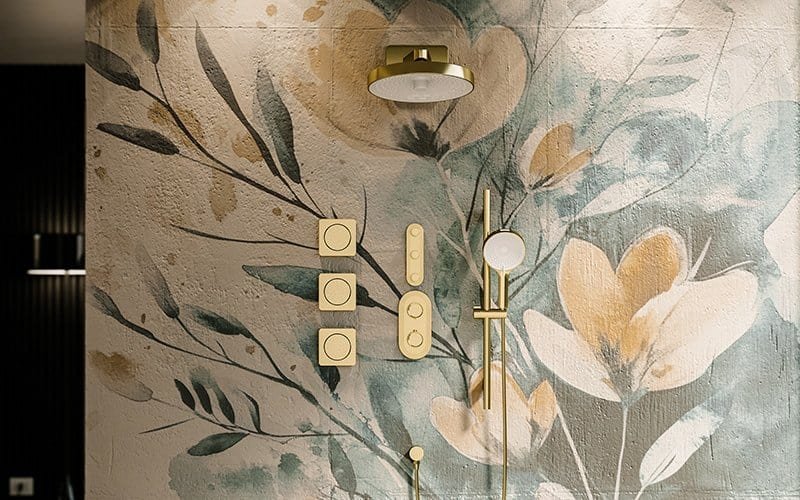
Wall-Mounted Shower System
The most common style, with showerheads and controls mounted on the shower wall; can include fixed or handheld showerheads
Best For: Small or modern bathrooms, those wanting a clean aesthetic, or users seeking easy-to-reach controls. Not ideal for renters, frequently changing user heights, or budgets avoiding wall alterations.
Key features of Wall-mounted Shower Systems:
- Showerhead (rain, standard, or handheld) fixed to the wall, often adjustable.
- Controls (single-handle, dual-handle, or digital) mounted on the wall for easy access.
- Optional extras like body sprays, diverters, or thermostatic/pressure-balancing valves.
- Available in finishes like chrome, brushed nickel, or matte black to match decor.
- Works with various water systems (combi boilers, gravity-fed).
Pros of Wall-mounted Shower Systems:
- Saves space with a sleek, built-in look, great for small or modern bathrooms.
- Easy to install and access, with controls at a convenient height.
- Flexible design supports multiple shower types (rain, handheld, multi-function).
- Easy to clean with fewer exposed parts compared to freestanding systems.
- Durable, with high-quality materials resisting corrosion in most models.
Cons of Wall-mounted Shower Systems:
- Installation requires wall modifications, which can be costly or complex.
- Fixed position limits adjustability compared to slide-bar or freestanding systems.
- May not suit tall/short users if height isn’t adjustable.
- Repairs can be tricky, needing access to plumbing behind the wall.
- Higher upfront cost for advanced models with thermostatic or digital controls.
Shower Tower / Column System:
A vertical, external unit that combines multiple shower features like a showerhead, handheld shower, body jets, and controls into one sleek panel or column, offering a spa-like experience.
Best For: Those wanting a luxurious, multi-function shower without major renovations, or small to medium bathrooms needing a compact, modern upgrade. Not ideal for low water pressure homes, tight budgets, or users needing height flexibility.
Key features of Shower Tower / Column System:
- All-in-one design with fixed showerhead, handheld shower, and body spray jets.
- Controls (single-handle, thermostatic, or digital) for temperature, flow, and function switching.
- Often includes extras like LED lights, shelves, or mirrors for convenience.
- Available in finishes like chrome, stainless steel, or matte black.
- Easy to retrofit, connecting to existing plumbing without major wall changes.
Pros of Shower Tower / Column System:
- Spa-like experience with multiple spray options (rain, massage, mist) in one unit.
- Easy to install, often requiring no major plumbing overhaul.
- Saves space with a compact, vertical design, great for small bathrooms.
- Customizable spray settings for different users or moods.
- Modern, sleek look adds a luxury feel to bathrooms.
Cons of Shower Tower / Column System:
- Can be expensive, especially for high-end models with digital or thermostatic
- Fixed height may not suit very tall or short users.
- Body jets can feel weak if the water pressure is low.
- Cleaning multiple nozzles and jets can be time-consuming.
- Repairs may require replacing the entire unit if parts aren’t modular.

Rainfall Shower System
A shower system featuring a large, overhead showerhead that mimics natural rainfall, often wall-mounted or ceiling-mounted, with options for additional features like handheld showers or controls.
Best For: Those seeking a luxurious, spa-like shower, larger bathrooms, or users wanting wide water coverage. Not ideal for low water pressure homes, small spaces, or water-saving needs.
Key features of Rainfall shower systems
- Wide showerhead (6-12 inches or more) for a gentle, rain-like water flow.
- Wall or ceiling-mounted, with adjustable angles in some models.
- Controls (single-handle, dual-handle, or thermostatic) for temperature and flow.
- Optional extras like handheld showers, body jets, or LED lights.
- Available in finishes like chrome, brushed nickel, or matte black.
Pros of Rainfall shower systems
- Relaxing, spa-like experience with broad, even water coverage.
- Great for all body types, covering more area than standard showers.
- Stylish, modern look enhances bathroom aesthetics.
- Easy to pair with handheld showers or diverters for versatility.
- Simple to clean with fewer crevices in basic models.
Cons of Rainfall shower systems
- Uses more water (2-5 GPM), increasing bills unless low-flow model chosen.
- Requires strong water pressure (40-60 PSI) for best performance.
- Ceiling-mounted models need complex installation and plumbing changes.
- Fixed height can be inconvenient for very tall or short users.
- Large showerheads may clog in hard water areas, needing regular cleaning.
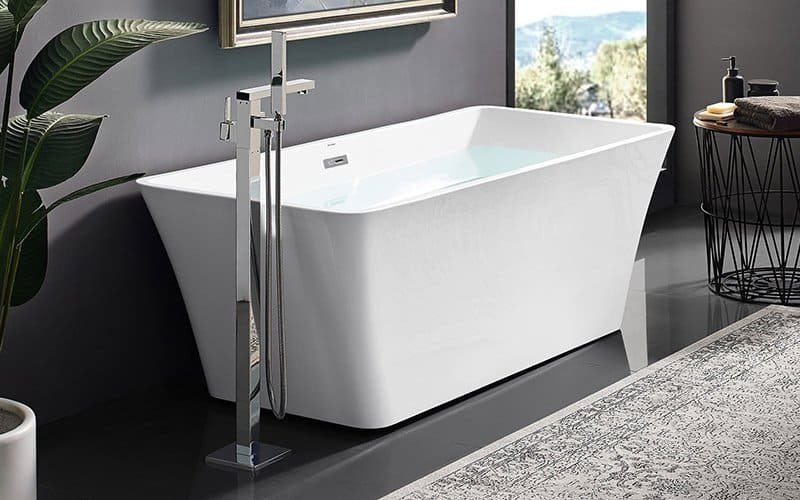
Freestanding / Stand-Up Bathtub Faucets
A vertical column mounted on the wall that includes multiple spray options such as overhead shower, handheld shower, and body jets, requiring strong water pressure and ample space
Best For: Homeowners adding a shower to a new space, those wanting a modern, self-contained unit, or anyone needing a quick retrofit. Not great for very small bathrooms or budgets avoiding cleaning maintenance.
Key Features of Freestanding bathtub faucets
- Floor-mounted design with a tall, arched spout to reach over the tub’s edge.
- Controls (single-handle, dual-handle, or thermostatic) for temperature and flow.
- Often includes a handheld showerhead for rinsing or versatility.
- Available in finishes like chrome, brushed nickel, matte black, or brass.
- May feature temperature limit settings or water-saving options in premium models.
Pros of Freestanding bathtub faucets
- Elegant, modern look enhances luxury bathrooms and pairs well with freestanding tubs.
- Flexible placement, allowing installation anywhere near the tub with floor plumbing.
- Easy to use, with accessible controls and optional handheld shower for convenience.
- Durable materials (brass or stainless steel) resist corrosion and wear.
- Can add to a home’s aesthetic appeal.
Cons of Freestanding bathtub faucets
- Expensive, with costs ranging from $200-$2,000+ plus professional installation.
- Requires floor plumbing, which can be complex and costly to set up.
- Takes up floor space, not ideal for small bathrooms.
- Exposed parts need regular cleaning to prevent water spots or limescale.
- Repairs can be tricky due to floor-mounted plumbing access.
Types of Shower Enclosures and Configurations
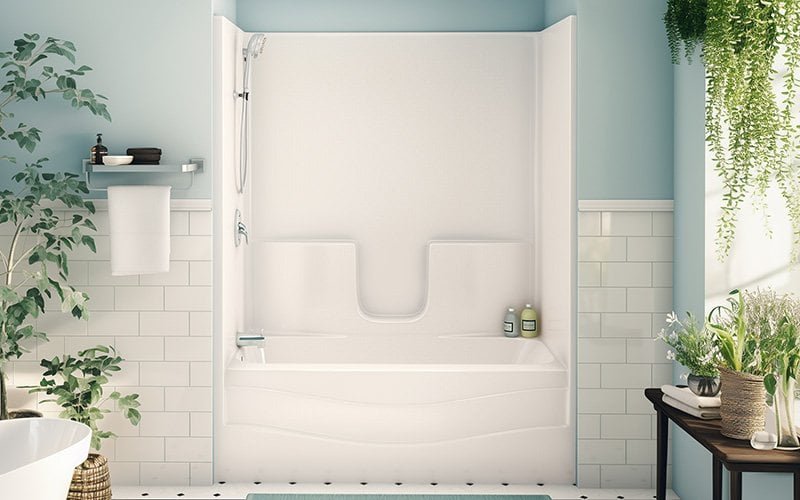
Prefabricated Shower
Factory-made shower units, often fiberglass or acrylic, that are easy to install and cost-effective
Best For: Budget-conscious homeowners, those needing a fast bathroom upgrade, or anyone wanting a low-maintenance, accessible shower. Not ideal for those seeking high-end, custom designs or large, spacious showers.
Key features of Prefabricated Shower
- Pre-built unit with integrated walls, floor pan, and door (glass or acrylic).
- Includes showerhead (standard, rain, or handheld), controls (single or dual-handle), and optional shelves or seats.
- Available in various sizes, shapes (square, corner, rectangular), and finishes (white, gray, or tiled look).
- May offer extras like grab bars, low-threshold entry, or slip-resistant floors.
- Designed to connect easily to existing plumbing with minimal modifications.
Pros of Prefabricated Shower
- Quick and easy to install, often completed in a day, ideal for renovations or tight schedules.
- Affordable compared to custom showers, with costs ranging from $300-$3,000.
Low maintenance, with smooth surfaces that resist mold and are easy to clean. - Durable materials withstand daily use and resist cracking or fading.
- Great for small spaces or accessibility needs with compact or ADA-compliant options.
Cons of Prefabricated Shower
- Limited customization, with fewer design or size options than custom showers.
- May look less luxurious or feel “plastic-like” compared to tiled showers.
- Glass doors or walls need regular cleaning to prevent water spots or soap scum.
- Not ideal for complex plumbing setups, as units are pre-designed for standard connections.
- Can feel cramped in smaller models, especially for taller or larger users.
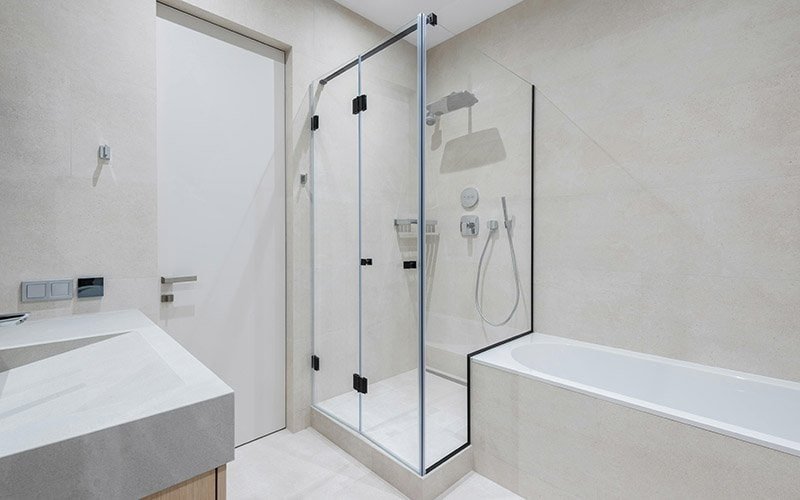
Walk-In Shower
A spacious, open shower design without a door or high threshold, featuring a showerhead, controls, and often customizable elements like glass walls or tiled surfaces, built for easy access and a modern look.
Best For: Those wanting an accessible, modern, or luxurious shower, larger bathrooms, or users with mobility needs. Not ideal for small spaces, tight budgets, or those wanting a fully enclosed, steam-retaining shower.
Key features of Walk-In Shower
- Open or partially enclosed design with low or no threshold for easy entry.
- Includes showerhead (rain, handheld, or standard), controls (single-handle, thermostatic, or digital), and optional body jets.
- Customizable with glass panels, tiles, benches, or grab bars.
- Available in various sizes and finishes (chrome, matte black, or natural stone).
- Often includes slip-resistant flooring and drainage systems like linear drains.
Pros of Walk-In Shower
- Easy to access, perfect for seniors, kids, or those with mobility issues.
- Spacious and open feel, making small bathrooms seem larger.
- Highly customizable with tiles, glass, or luxury features like steam or multi-heads.
- Easy to clean with fewer crevices and modern drainage systems.
- Stylish, modern design enhances bathroom appeal.
Cons of Walk-In Shower
- Expensive to install, especially for custom designs ($2,000-$10,000+).
- Open design can cause water splashing, requiring good drainage and larger space.
- May feel cold without a door, and steam escapes easily.
- Requires professional installation for proper waterproofing and slope.
- Glass panels or tiles need regular cleaning to prevent water spots or grout issues.
Corner Shower
Space-saving shower installed in a bathroom corner, usually with glass panels and a door, available in square or neo-angle shapes
Best For: Small bathrooms, budget-conscious homeowners, or those needing a compact, functional shower. Not ideal for those wanting a spacious or high-end luxury shower experience.
Key Features of Corner Shower
- Space-saving design with two walls meeting at a corner, often with a curved or angled door.
- Includes showerhead (standard, rain, or handheld), controls (single or dual-handle), and optional shelves or seats.
- Made of glass, acrylic, or tiled surfaces, with finishes like chrome or brushed nickel.
- Available in prefabricated or custom-built options, with sizes from 32×32 inches upward.
- May include accessibility features like low thresholds or grab bars.
Pros of Corner Shower
- Perfect for small bathrooms, using corner space efficiently.
- Affordable, especially prefab models ($300-$2,500), compared to larger showers.
- Easy to install, with prefab units connecting to existing plumbing quickly.
- Enclosed design keeps water contained, reducing bathroom mess.
- Customizable with tiles, glass, or extras like handheld showers for flexibility.
Cons of Corner Shower
- Limited space can feel cramped, especially for taller or larger users.
- Less luxurious look compared to walk-in or freestanding showers.
- Glass doors need regular cleaning to prevent soap scum or water spots.
- Custom corner showers are pricier and require more complex installation.
- May not fit multi-function features like body jets due to size constraints.
Summary Table of Common Shower System Types
| Types of shower system | Key Features | Best For |
|---|---|---|
| Single-Handle | Simple control of flow and temperature | Basic functionality |
| Dual-Handle | Separate temperature and flow controls | Precise adjustments |
| Thermostatic | Maintains constant temperature | Temperature consistency |
| Pressure-Balancing | Adjusts pressure to prevent temperature shocks | Affordable option |
| Digital | Electronic controls, presets, app connectivity | Tech-savvy users |
| Electric (On-Demand) | Instant water heating via electric element | Energy savings, instant hot water |
| Steam | Generates steam for spa-like experience | Creates a steam environment |
| Wall-Mounted | Fixed or handheld showerhead on wall | Most common style |
| Rainfall | Large overhead showerhead mimicking rain | Spa-like, immersive shower |
| Shower Tower / Column | Multiple spray options in one vertical unit | Spacious bathrooms with strong pressure |
| Freestanding / Stand-Up | Self-contained unit, no framing needed | Basement or flexible placement |
| Prefabricated | Factory-made, easy to install | Budget and quick installation |
| Walk-In | No curb, easy access | Accessibility and modern design |
| Corner | Space-saving, glass enclosure | Small bathrooms |
Conclusion:
Choosing the Right Types of Shower Systems:
The right shower system depends on your personal preferences, budget, and bathroom setup. Whether you want a simple setup or a high-tech luxury experience, there’s a shower system for you.
FAQs
Related Posts




